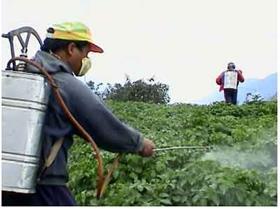
The United Fresh Produce Association has released a statement reacting to a television programme shown on CNN in the US, 'Toxic America', which made reference to the Environmental Working Group's (EWG) so-called 'dirty dozen' list of fruits and vegetables.
The two-part investigative broadcast, which was aimed at studying potentially harmful chemicals in the US, mentioned the 'dirty dozen' – the result of the EWG studying 'nearly 100,000' US Department of Agriculture (USDA) pesticide reports and apparently finding 12 fruit and vegetable products that contained '47-67 pesticides per serving'.
As part of its findings the group suggested limiting the consumption of pesticides by purchasing organically grown varieties of the 12 products – celery, peaches, strawberries, apples, domestic blueberries, nectarines, sweet bell peppers, leafy greens, cherries, potatoes, lettuce and imported grapes – which in turn could 'reduce exposure to pesticides by up to 80 per cent', according to EWG's Amy Rosenthal.
However, United Fresh pointed out that the fresh produce industry had always been committed to producing high quality fresh produce, and that strict federal regulations were in place regarding the use of pesticides, resulting in non-detectable or extremely low residues.
'According to the 2008 USDA Pesticide Data Programme Report, 98 per cent of tested fresh fruit and vegetables had no detectable residues,' United Fresh noted. 'And of the remaining 2 per cent, the vast majority of detections were well below established tolerances and/or action levels.'
The Association added that the EWG had acted irresponsibly in bending facts to suit its personal cause, confusing customers and potentially turning them away from fresh produce when authorities had been striving to increase fruit and vegetable consumption.
'At a time when federal authorities strongly urge Americans to double their intake of nutritious fruits and vegetables to improve their health, creating needless alarm about infinitesimally small residues could actually discourage consumption of fresh produce, thereby negatively affecting the health of millions of American consumers,' United Fresh noted.



